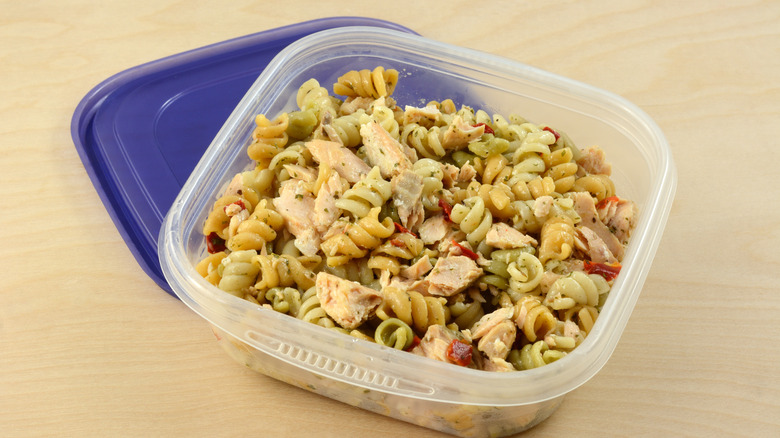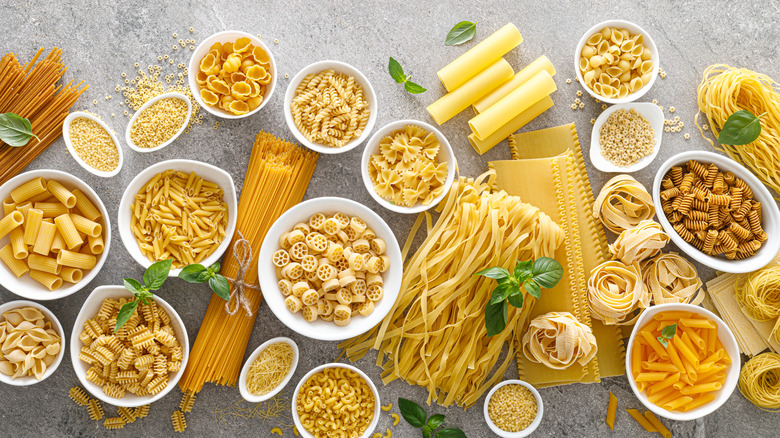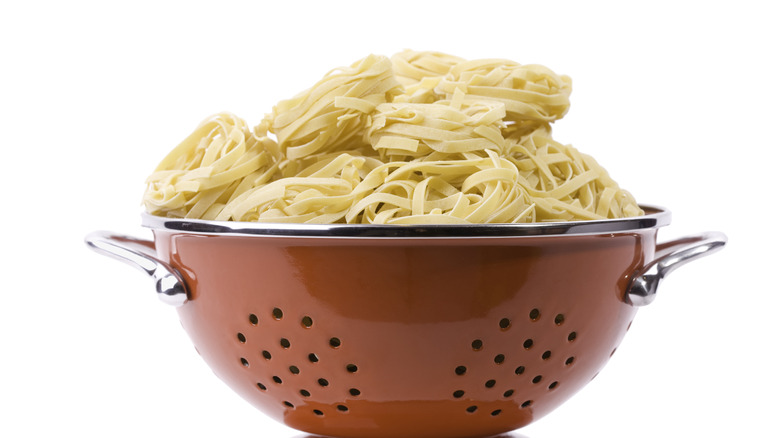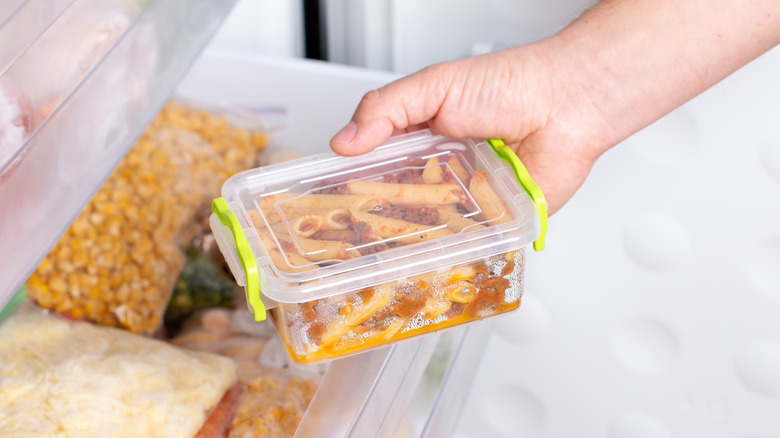How Long Is Leftover Pasta Really Good For In The Fridge?
It's almost too easy to cook more pasta than you'll eat in one meal. When you're standing over a pot of boiling water with a box in hand, it's hard not to shake in a couple of extra penne, shells, or rotini, just in case you need more than your recipe calls for. We often eat with our eyes, and dried pasta is roughly half the size of cooked pasta, which can result in too many noodles — but if you have leftover pasta, it's no big deal. It's easy to reheat it the next day, or perhaps make pasta salad. Cooked pasta doesn't last all that long in the fridge, however. If you have some hanging around, make sure you use it in 3 to 5 days.
Depending on the variety of pasta, a container of leftover noodles can start to go south pretty fast in the refrigerator. Fresh pasta, of course, goes bad much faster than dried-and-cooked pasta. Proper or improper storage also makes a big difference in pasta's shelf life. So if you wind up with a bunch of extra spaghetti, make sure you pack it properly before you put it in the fridge and use it up as soon as you can, unless you plan to freeze it.
Pasta type matters
Dried pasta has an impressively long shelf life of up to two years. Cooked pasta, however, is a totally different story. Just because you've had a box of spaghetti hanging around in the pantry for months doesn't mean it's okay to leave the cooked version sitting in a bag for a week. Once your pasta is cooked, it becomes susceptible to mold, spoilage, and foodborne bacteria, just like any other perishable food.
Different varieties of pasta can also spoil faster than others. Store-bought, fresh pasta is only good for 1 to 3 days, according to Healthline, while homemade fresh pasta is good for 4 to 5 days. However, once cooked, most pasta spoils in about 3 to 5 days. This includes stuffed pastas like tortellini and ravioli, as well as gluten-free, lentil-based, and bean-based pastas.
On another note, if your pasta is mixed with an acidic pasta sauce, like the tomato sauce in baked ziti or a lasagna, you can safely eat it right up to day 5, because the lower pH of an acidic sauce will prevent mold and bacteria from growing as quickly. Pasta mixed with sauce will still go bad, eventually, and if extra ingredients like meat or dairy are mixed into your sauce, it can shorten that 5-day shelf life by a day or two.
How to tell if your pasta has gone bad
If you pile leftover pasta into a container and stuff it in the fridge without a label, then wait a couple days, you might not know how old your spaghetti or farfalle is. There are a few signs to look for that can tell you when your pasta is going bad, and should be tossed out or composted.
If your pasta is stored without sauce, the easiest way to know if it's past its prime is to open the package and touch it. If the surface of the pasta is getting slimy, it's going bad. Also, take a look at the surface of the pasta to see if it's looking gray or pale, which means it's going to start growing mold soon. Expired pasta can also smell off or sour, so give the container or bag a sniff if you're not sure if the noodles are okay to eat.
Relying on visual cues to know if pasta is safe to eat is kind of risky, however. It's always a good practice to label and date anything you store in the fridge so you know exactly when it was cooked. If you don't want to keep a roll of tape or labels around, you can write right on the containers with a dry erase marker and wipe it off later.
Proper pasta storage
While experts say that leftover pasta is good for up to 5 days, that number is contingent on how well you store it. If you don't use an airtight container or bag, or you don't close it correctly, the pasta will dry out and grow mold faster. Snap-top glass or plastic containers, plastic Tupperware-style boxes and bowls, and even zip-top plastic bags will all work well. Also, don't let your leftover pasta sit around for too long after it's cooked. Neglecting to hastily put food in storage can cause it to spoil faster. Once you know you won't be eating the noodles just yet, toss them with a little oil and store them in the fridge within an hour or two, after the pasta is completely cooled.
You can also freeze leftover pasta if you're not planning to eat it in the next few days. Make sure the pasta is completely cool before loading it into plastic bags, which will take up less space in your freezer. Mix a little bit of oil with the pasta, press as much air as possible out of the bag, then label and date the bag. Your frozen pasta will be good for around 2 months. When you're ready to use it, just pop the bag in the fridge for a few hours to thaw. Once the noodles are thawed, you can freshen them up with a little water, and your pasta is as good as new.



